Don't Piss Down My Back and Tell Me It's Raining Outlaw Josey Wales
Don't Piss Down My Back & Tell Me It's Raining
The Outlaw Josey Wales & the Real Forrest Carter
WARNING: The following includes the use of obscene language & politically controversial subject matter. Reader discretion is advised.
Whenever discussing the topic of the Civil War in modern America, the potential of the conversation getting ugly & befuddled in neo-confederate ideology is very real. This is partly due to the South's ability to write it's own version of history (in contrast to the historiographic idea that history is written almost exclusively by "the winners") for the past century & a half. This was also one of the first poltical ideologies to be put to film, going as far back as 1915 with The Birth of a Nation; & ever since, the "lost cause" myth of the Confederacy has been galvanized on the silver screen (from 1926's The General, to 1939's Gone With the Wind, to 1958's Quantrill's Raiders, to 2003's Gods & Generals, to 2014's Field of Lost Shoes). However, one film in particular, seems to make an astonishing deviation from the bunch. Clint Eastwood's 1976 masterpiece The Outlaw Josey Wales.
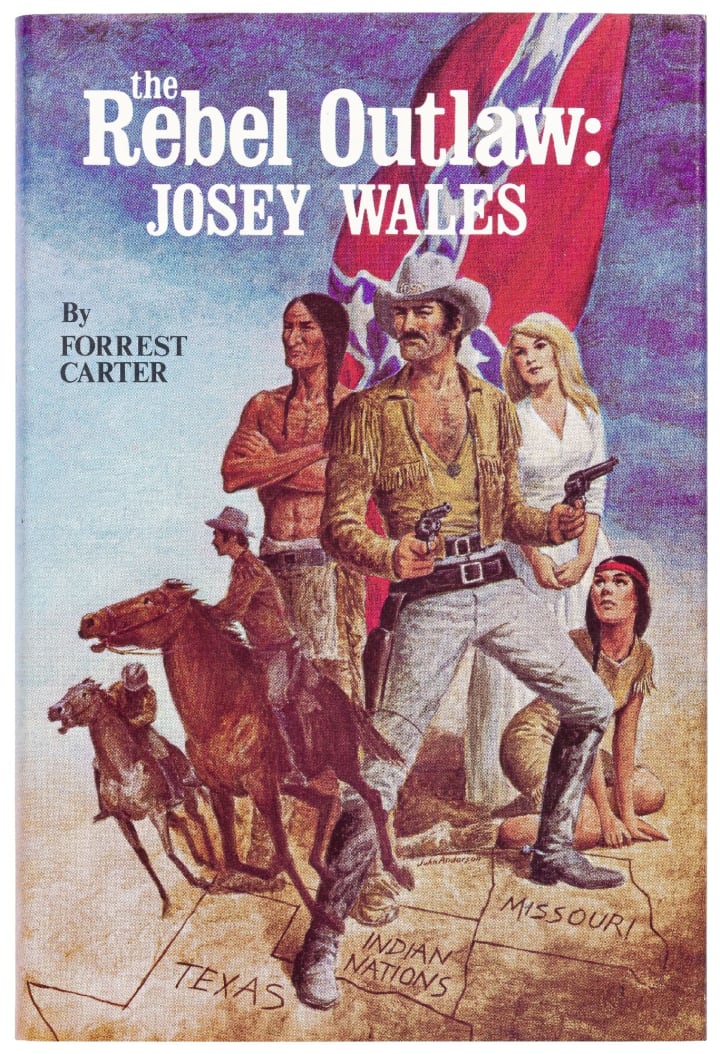
Based on a novel by half-Cherokee author, Forrest Carter (known more famously for his childhood memoir The Education of Little Tree) the film surrounds a pro-Confederate guerilla fighter in Missouri, who refuses to surrender in 1865. Being hunted down by Union partisans and reward-hungry bounty hunters, Josey Wales flees to Texas, all the while shooting his way across the frontier and leaving a trail of dead Yankees in his wake.
Having said the synopsis of the film, it is almost self-evident that the Union forces are the antogonists. Yet, unlike other Civil War films which center on the Confederate perspective, The Outlaw Josey Wales never tries to claim any sense of objective political neutrality while simultanously shoving lost cause rhetoric down the viewer's throat. Only in the few scenes with the carpetbagger/snake oil salesman character does it let off small whiffs of it (like a bedroom fart at 2:00 in the morning). So how is it possible then to make a Civil War movie about the "Johnny Reb" side of the conflict without offending audiences or violating the legitimacy of the historical record? Simple. Our protagonist is objectivly relatable & worthy of support. By having both Carter's novel & Eastwood's film take place in Missouri the historical aspects of the American frontier during the era of the Civil War are highlighted extremely well. Union & Confederate regulars, as well as para-military groups commited acts of violence upon each other equal to street gang violence seen in the urban enviornments of the modern world. Such as, the gunning down of innocent civilians in broad daylight & on the comfort of their own front porches. Even prior to the secessionist movement that would make up the Confederate States of America as a soverign nation, the issue of slavery & statehood militantly divided the communities of Kansas & Missouri into a horrendous warzone (as early as the 1850's).
With these instances of total war & radical vigilantism happening more often in this region than in the eastern front of the conflict, audiences can understand how atrocious they truly were, as well as have pity on those who fell victim to it. When Josey's homestead is set alfame & his family murdered by Union "Red Legs", it makes more sense why he would want to fight againt the Union. If the viewer were to walk a mile in his shoes, then they would most likley do so as well. It's certainly much easier to empathize than some privileged, manipulative, slave-owning, southern belle who is driven from her plantation home in Atlanta. He's a dirt poor farmer, simply minding his own business, only to senselessly lose everything he owned & loved in the name of the Northern cause. For even though he becomes a cold-blooded killer with notches on his guns, he's still a good person with a solid moral compass; unlike Captain Terrill or any of the bounty hunters who are willing to go to any means necessary (moral or otherwise) to get the reward money on his head. Furthermore, in terms of the cinematic executuion, the movie is able to simplify the Confederate point of view with very little dialogue it's opening scenes.
Whereas a movie like Gods & Generals (a movie that's over 4 hours long, counting the director's cut) resorts to dull rambling speech after dull rambling speech to fuse neo-confederate propaganda into the viewer's head like a hole being slowly and painfully drilled through the skull.
Case in point. When in the business of filmmaking, one must fully understand that STORY COMES FIRST. In the case of Josey Wales, he is a man who loses everything & gives up on life, only to circumstantially create a new surrogate family as he makes his way to Texas. His care for them and willingness to kill those who would dare to harm them, allows him to gain a new sense of purpose. The fact that he's a Confederate guerilla who continues to fight on after the war's end is a secondary element to his character. His evolution from the beggining of the film to the end comes first and foremost. Unlike Scarlett O'Hara, in Gone With the Wind, who is introduced as an egotisitical & devious socialite, and remains that way by the end of the film.
Furthermore, what also deviates this movie from the rest of it's ilk, is it's ability to resonate with it's audience not only on an emotional level but on a social level. Given that the movie was release in 1976, the movie's (as well as the book's) themes of individualism & self rule struck strong chords with the political cynicism of the post-Vietnam era. For by the time Wales sets up his new home in Texas, his surrograte family he's aquired along the way is made of a wide variety of people. Such as a Cherokee elder, a young Navajo woman, a grandmother & granddaughter from Kansas, and some surviving locals of the neighboring ghost town of Santo Rio. All of these people share the fact that they were all screwed over by "the system" one way or another & find common ground by their desire to live according to their own terms. Certainly, a desire that most Americans can relate to. Not just lost cause lunatics who can't take the pill.
Now, if one were to ask me personally, I would confess that I would like to see a legitimate Civil War film, with both a sense of quality, piteous Confederate characters, and is more historically accurate. I say that, because The Outlaw Josey Wales is (in terms of genre) a western. Not a war film. Western movies, almost by their definition, are stories based on the fantastical ideas of what real life in the American frontier was really like. They're cinematic swan songs which eulogize a byegone era. Yet it can be fair to say that while sitting in both the actor's chair & the director's chair, Clint Eastwood used the western formula to showcase the Confederate experience of defeat very authentically. He impeccably captures on camera the sense of embarrassment shared by an entire generation of people who betrayed their country to one their own, only to be militarily crushed & forced to look their enemy in the face and swear loyalty to "their" country & "their" cause. Objectively, nothing will ever justify the racially & politically motivated violence commited by the hands of ex-Confederates & their descendants; though, at the same time, it's not hard to understand why they did so in the name of vengeance towards their wartime opposers.
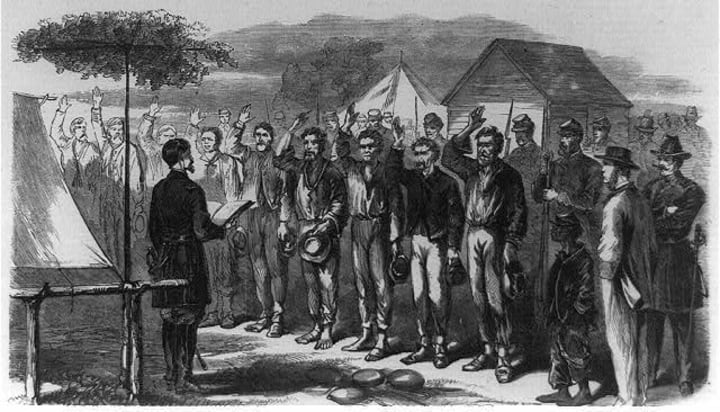
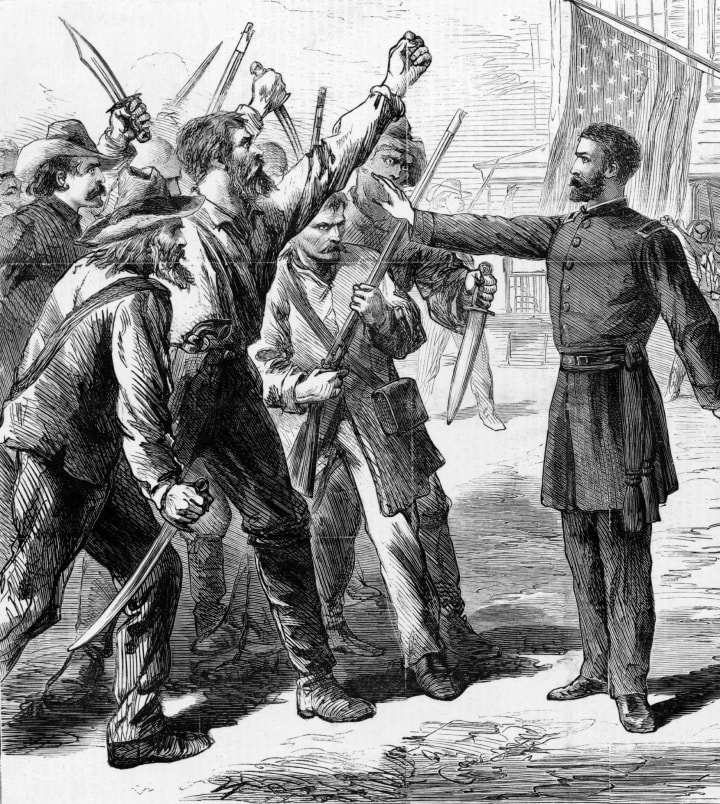
Needless to say, generational hatred can become a malevolent & dangerous thing. Which leads me to one ultimate question. A question about this movie's source material. What would Forrest Carter, a half-Cherokee, nonconformist, author know about the Confederacy? Seriously. Should we really believe that some aspiring, cowboy, guru, writer could vividly put to pen and paper the pain & anger of the Old South? Well, frankly, the answer is no. The reason why may disturb you.
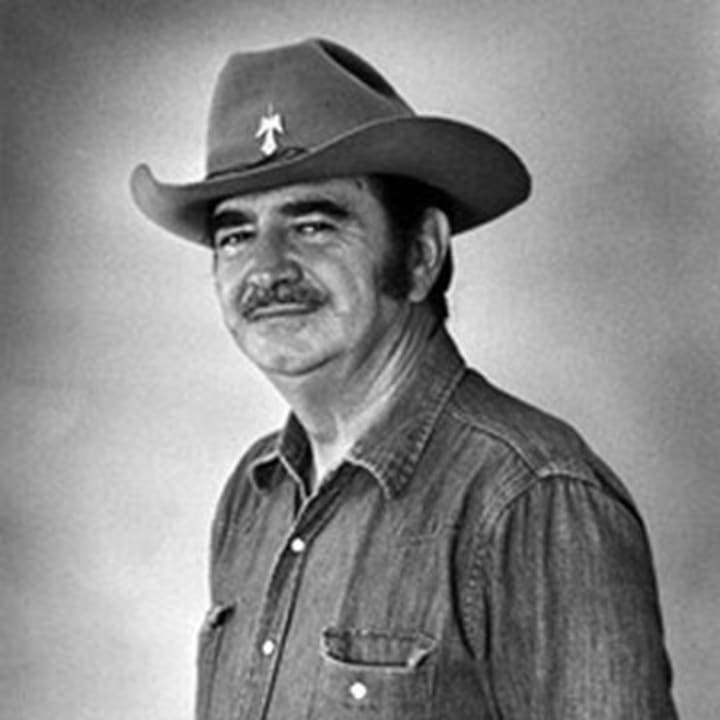
You see, Around the same time of the movie's release in 1976, Forrest Carter made a television appearance on The Barbara Walters Show to promote both the film and his book, but also, to discuss his life & career as an author. Throughout the course of the interview, he kept his hat cocked low to cover his eyes and he never looked directly at the camera. Being that it was his first appearance on national television, most viewers watching at home assume he was either camera shy or was battleing stage fright. However some viewers claimed that he looked awfully familiar to one Asa Carter.
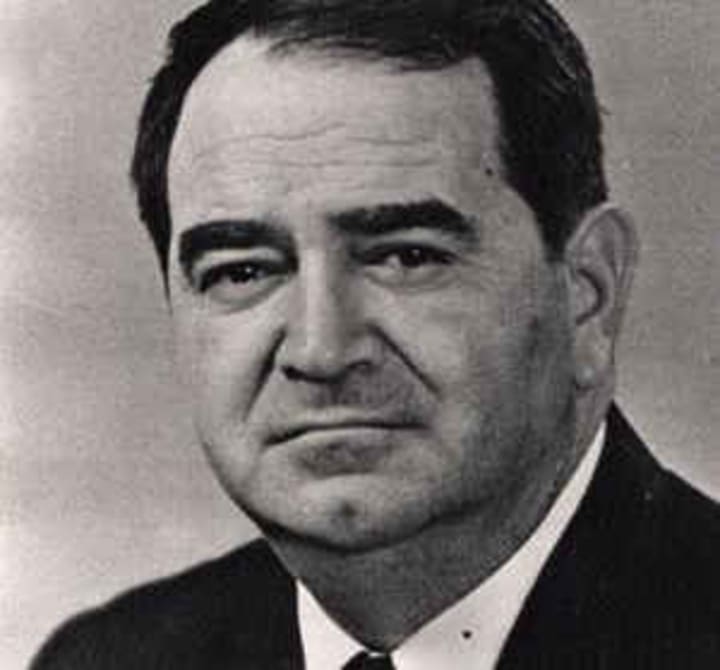
Asa Carter was not an author. He also wasn't part Native American. Asa Carter was a radio personality & political speech writer in Alabama, who had fallen out of the public eye after a failed campaign for the state governor's office in 1970 (coincidentally around the same time Forrest Carter set himself up in Texas as an author). Yet, most importantly, Asa Carter was one of the most radical segregationists in the history of the Civil Rights Movement.
- He privatley wrote campaign speeches for Alabama governor, George Wallace (a noted white supremacist). Including his most infamous speech which included the lines "Segregation now. Segregation tommorow, and segregation forever!"
- He created his own separatist faction of the Ku Klux Klan, called "The Original Ku Klux Klan of the Confederacy" in 1955; on the grounds that he believed that the regular K.K.K. wasn't anti-semetic enough.
- Known members of Carter's group attempted to assassinate Nat King Cole while performing on tour in Birmingham. Following their arrest, they argued that they did it in order to stop rock and roll music from encouraging race mixing.
- In 1956, Asa spoke before a rally of protesters in Tennesee against a public school that was one of the first in the state to integrate white and black students together. Following his oration, a mob of several hundred people proceeded to attack black passers-by, as well as set off a bomb in an adjacent black neighborhood.
- Other members of Carter's group participated in the kidnapping of a black judge named Edward Aaron (who just so happened to suffer from mental disabilities). They beat him, carved the initials "K.K.K." into his chest with a pocket knife, castrated him with a brazor blade, dowsed him with turpentine, shoved him into the trunk of a car, and left him to die on the side of the road (supposedly keeping his scrotum as a "trophy").
All & all, Asa Carter's activities resulted in an F.B.I. file bearing his name on it, over the course of a decade grew to be over 1,000 pages thick. Throughout his lifetime, Forrest Carter constantly denied that he was Asa Carter, until his death in 1979. Finally, in 1991, a New York Times exposé revealed that both men really were one in the same. His childhood memoir, The Education of Little Tree, (that for the longest time was used as a required text for college courses on Native American studies) was labelled a hoax; even going so far as to have Oprah Winfrey remove it from her list of recommended books on her website.
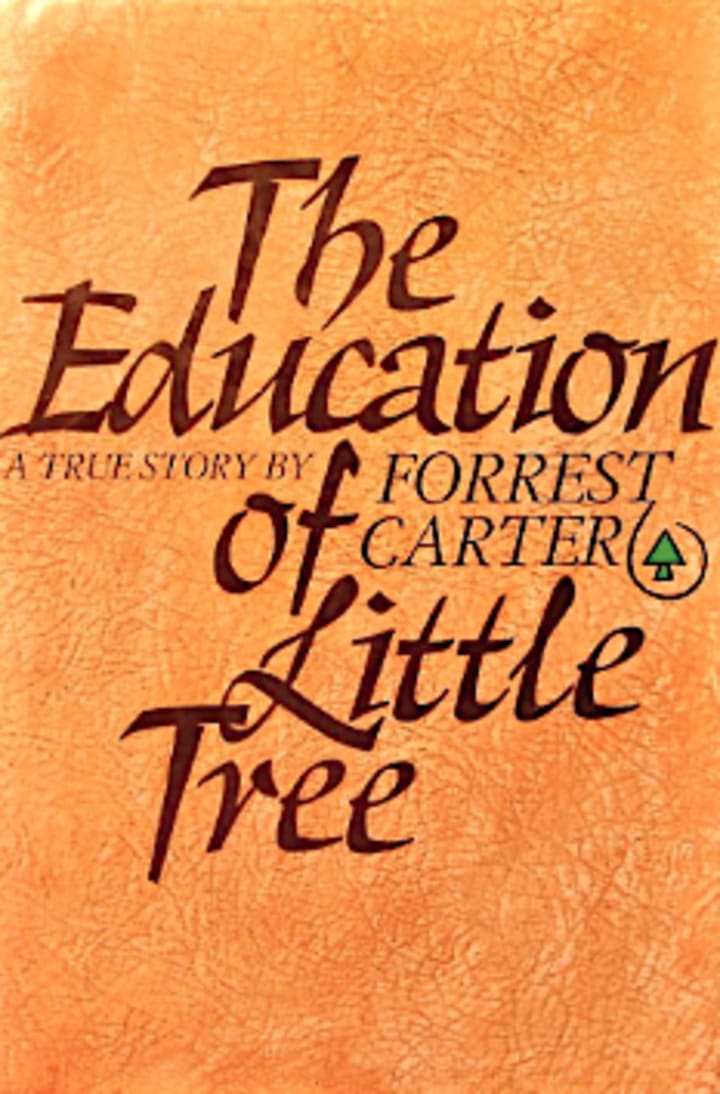
What must we now think of The Outlaw Josey Wales; this wonderfully written western odyssey about a man who abandons the battlegrounds of the South to a safe haven on the frontier, living in daily fear that he'll be recognized from his stained image & dark past? Personally, I'll never stop loving the movie (which, by the way, nobody who worked on the film even knew who Mr. Carter was; not even Clint Eastwood). I'm also a fan of the book, but ever since learning who the real author was, I'll never be able to look at it the same way, again. From the story of his creation, we can ponder the idea that maybe Asa Carter, this racist, xenophobic, monster of a man, wrote it as a means to atone for his past life & move on as a better person. Though, I'd be lying if I said that I believe that to be so. Josey Wales faced the consequences of his actions and was able to find redemption following his final clash with Captain Terrill.
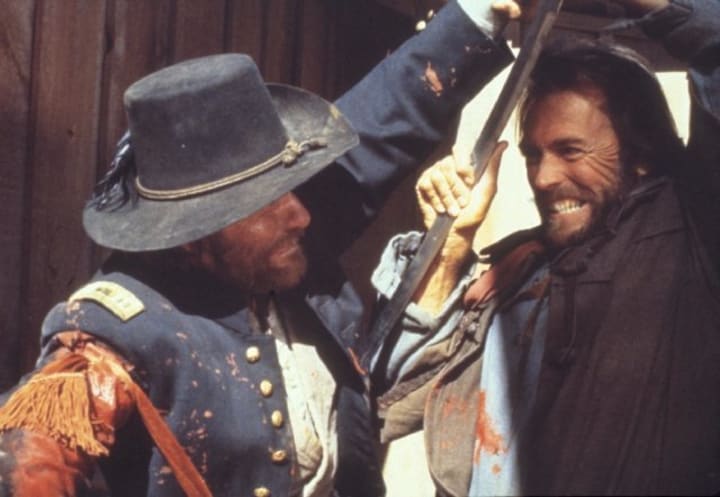
Mr. Carter did anything but that. He went to great lengths to avoid the consequences of his actions & never atoned for his mistakes. He ran away from them. As a modern society, we can (and ought to) pass judgement on the content of his character. Though, we should also recognize that if anyone who's lived in the past century could understand the humiliation & outrage of the Confederate spirit on an intense and intimate level, it would be Mr. Carter.
movie
Jacob Herr
Born & raised in the American heartland, Jacob Herr graduated from Butler University with a dual degree in theatre & history. He is a rough, tumble, and humble artist, known to write about a little bit of everything.
Don't Piss Down My Back and Tell Me It's Raining Outlaw Josey Wales
Source: https://vocal.media/geeks/don-t-piss-down-my-back-and-tell-me-it-s-raining
0 Response to "Don't Piss Down My Back and Tell Me It's Raining Outlaw Josey Wales"
Post a Comment